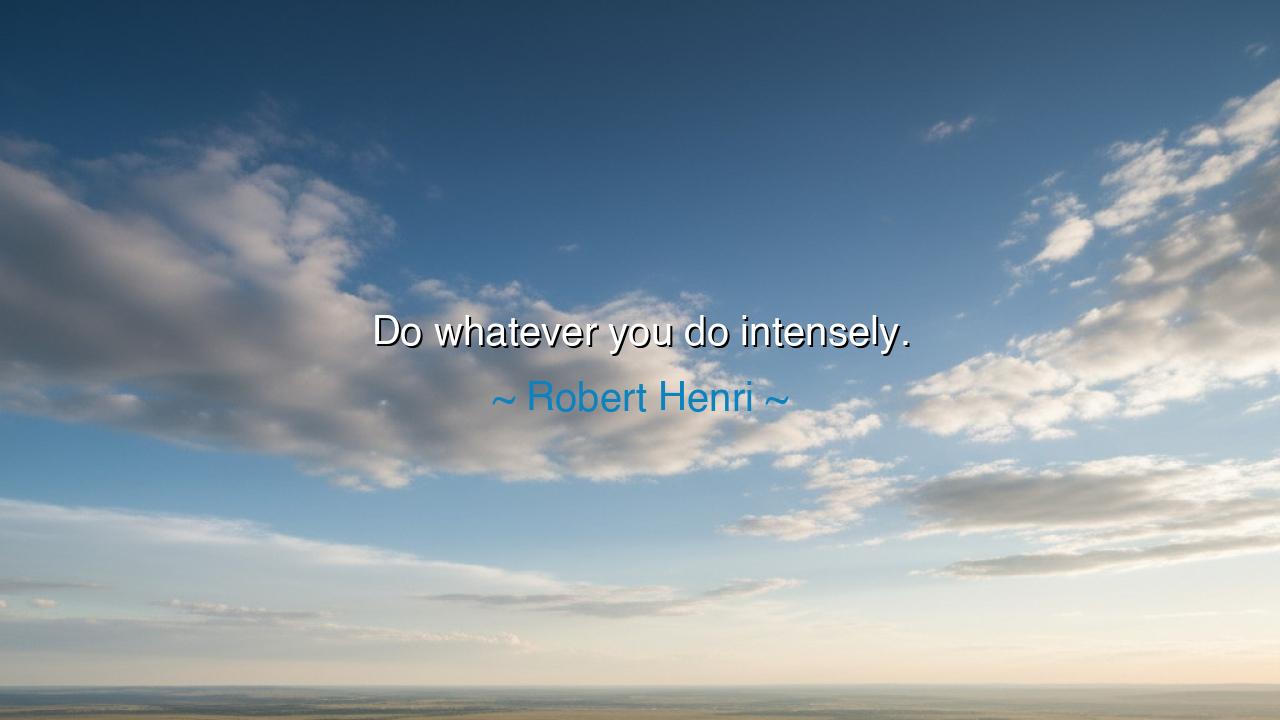
Do whatever you do intensely.






In the words of Robert Henri, the painter and teacher whose voice urged artists to live boldly, we are given a command that strikes like thunder: “Do whatever you do intensely.” This is not the counsel of moderation, nor the whisper of comfort. It is the cry of a spirit that knows life is short, and that only those who pour themselves fully into their actions taste the richness of existence. To live half-heartedly is to squander the gift of breath; to live with intensity is to set one’s soul aflame, so that each deed, whether great or small, becomes a mark of vitality.
The origin of this wisdom lies in Henri’s vision of art as more than technique. To him, painting was not merely the arrangement of colors on canvas, but the expression of life itself. He taught his students that the power of a work was not in perfection of form but in the passion behind the stroke. Intensity, he believed, was the difference between mediocrity and greatness—not only in art, but in all human effort. From this conviction came his cry: whatever you do, give it the full measure of your spirit, and the world will feel its force.
History shines with examples of this truth. Consider Michelangelo, whose labor upon the Sistine Chapel nearly broke his body. For years he painted lying on scaffolds, his arms trembling, his eyes burning from paint and dust. Yet the intensity with which he poured himself into that ceiling gave the world one of its greatest treasures. Had he worked timidly, sparing his effort, the result would have been forgotten. But because he gave all, his work endures for centuries as a monument to passion.
The ancients, too, praised this principle. The Stoics urged men to live each day as if it were their last, with full attention and vigor. Marcus Aurelius warned against wasting hours in distraction, declaring that the worth of a man is measured by how fully he applies himself to the task at hand. Even warriors knew this truth: a soldier who strikes without commitment falters, but one who strikes with intensity drives through the shield and claims victory. The lesson is eternal: half-measures are the enemy of greatness.
The meaning of Henri’s words is that life responds to the energy we give it. A task approached with weakness yields little fruit, but the same task, embraced with fervor, produces unexpected abundance. Whether one paints, writes, builds, or leads, the spirit with which he works infuses the work itself. To live intensely is not to rush or burn out, but to bring one’s full presence, one’s heart and will, into the moment. In such living, even ordinary deeds become extraordinary.
The lesson for us is clear: do not drift through life in apathy. Whatever you choose to do—be it labor, study, love, or service—do it as though your very soul were on the line. For a life of half-effort breeds regret, but a life lived with intensity, even if marked by failures, leaves behind no shame. The world honors not the cautious dabbler but the one who dares to live fiercely, to act with fire.
Practical counsel is this: each morning, choose one thing you will do with full commitment. Approach your work as if it were the only chance you had to prove your strength. When with loved ones, give them not fragments of your attention but the fullness of your heart. When pursuing a goal, let distractions fall away and channel yourself wholly into the task. In this practice, you will find that your days grow richer, your accomplishments deeper, and your spirit stronger.
Thus, Henri’s words resound as an eternal summons: “Do whatever you do intensely.” They call us away from mediocrity, away from the lukewarm existence, and toward a life lived like fire against the night. Children of tomorrow, remember this teaching: the world does not need more half-hearted lives. It needs souls who live and labor with such intensity that their presence becomes a beacon for all who follow.






AAdministratorAdministrator
Welcome, honored guests. Please leave a comment, we will respond soon